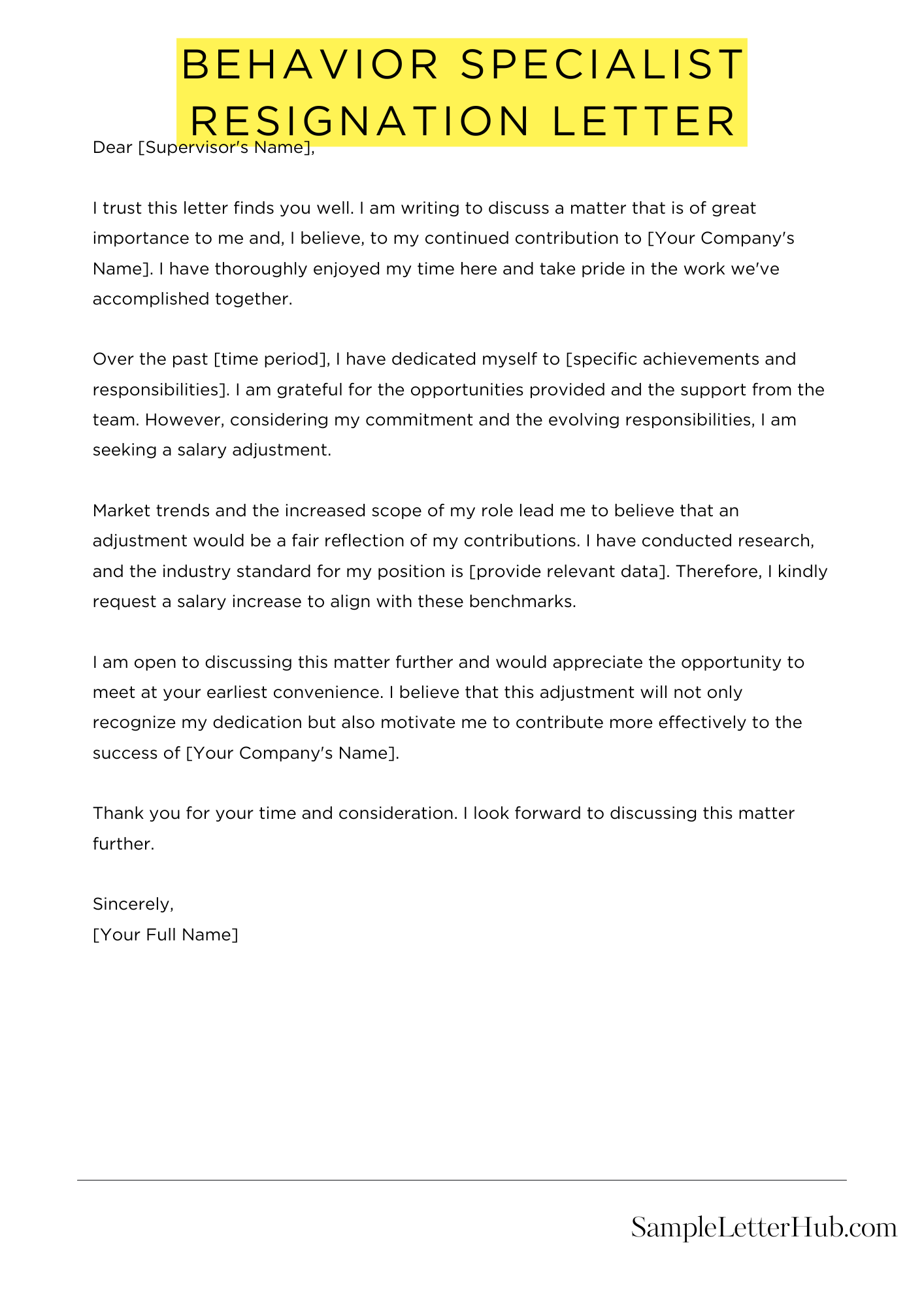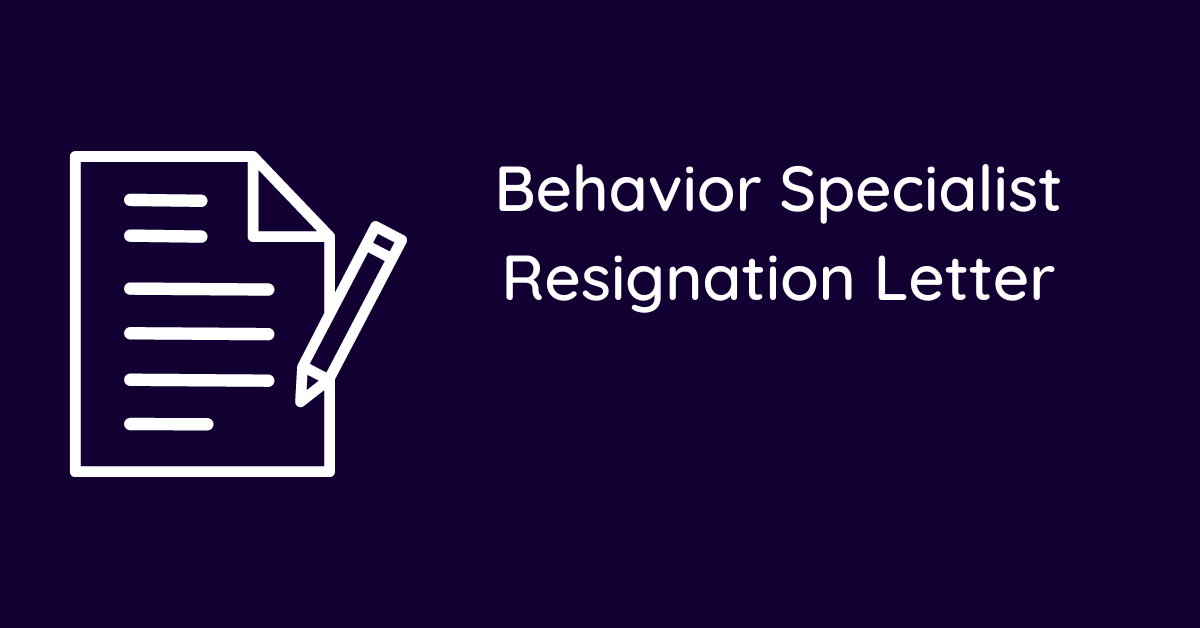Are you a behavior specialist who is thinking about resigning from your job? If so, you’re not alone. Many behavior specialists find themselves at a point in their careers where they are ready for a change. Whether you’re looking for a new challenge, a higher salary, or a better work-life balance, there are many reasons why you might decide to resign from your current position.
One of the most important things you can do when you’re resigning from a job is to write a clear and professional resignation letter. This letter should explain your decision to leave, and it should be polite and humble in tone. It’s also important to be specific about your last date of employment. This will help your employer to plan for your departure.
Below, we have shared a template/example behavior specialist resignation letter that you can use. This letter is designed to be clear, concise, and professional. It can be easily customized to fit your specific needs.
Behavior Specialist Resignation Letter
Dear [Recipient Name],
Please accept this letter as formal notification that I will be resigning from my position as a Behavior Specialist at [Organization Name], effective two weeks from today, [Date].
During my time at [Organization Name], I have gained valuable experience and knowledge in the field of behavior analysis. I am grateful for the opportunities I have been given and the support I have received from my colleagues and supervisors.
I wish you and [Organization Name] all the best in the future.
Sincerely,
[Your Signature]
Short Behavior Specialist Resignation Letter Sample
Please accept this letter as formal notification that I am resigning from my position as Behavior Specialist at [Company Name]. My last day of employment will be [Your Last Day]. Thank you for the opportunity to grow and learn during my time here. I wish you and the company continued success. I am happy to assist in the transition process to ensure a smooth handover of my responsibilities.
I wish you all the best with your behavior specialist resignation letter.
When it’s time to say farewell, expressing your gratitude and best wishes can make the transition smoother:

How to Write a Behavior Specialist Resignation Letter
1. Start with a Formal Introduction
Begin your letter with a formal salutation, such as “Dear [Recipient Name].” State your name, position, and the date you will be leaving.
2. Express Gratitude and Appreciation
Thank your employer for the opportunity to work as a behavior specialist. Mention specific experiences or accomplishments that you are grateful for.
3. State Your Reason for Resigning
Clearly state your reason for leaving. Be professional and avoid negative language. Focus on your personal growth or career goals.
4. Offer to Assist with the Transition
Let your employer know that you are willing to help with the transition during your notice period. Offer to train your replacement or provide documentation.
5. Close with Professionalism
End your letter with a polite closing, such as “Sincerely,” followed by your signature and typed name.
6 Most Frequently Asked Questions About Behavior Specialist Resignation Letter
Behavior specialists play a vital role in the lives of children with special needs. They provide support, guidance, and expertise to help children reach their full potential. However, there may come a time when a behavior specialist decides to resign from their position. Here are the six most frequently asked questions about behavior specialist resignation letters:
1. What should I include in my resignation letter?
Your resignation letter should include the following information:
- Your name and position
- The date you are resigning
- The name of the person you are resigning to
- A brief statement expressing your gratitude for the opportunity to work as a behavior specialist
- A statement of your future plans (optional)
2. How should I format my resignation letter?
Your resignation letter should be formatted in a professional manner. It should be single-spaced, with one-inch margins on all sides. The font should be easy to read, such as Times New Roman or Arial.
3. What should I do if I am resigning from a position that I have held for a long time?
If you have been a behavior specialist for a long time, you may want to give your employer more notice than the standard two weeks. This will give them time to find a replacement and ensure a smooth transition.
4. What should I do if I am resigning from a position that I do not like?
Even if you are not happy with your current position, it is important to remain professional in your resignation letter. Express your gratitude for the opportunity to work as a behavior specialist, and wish your employer well in the future.
5. What should I do if I am resigning from a position to take a new job?
If you are resigning from a position to take a new job, you should mention this in your resignation letter. Be sure to express your excitement about the new opportunity, and thank your employer for their support.
6. What should I do if I am resigning from a position to pursue other interests?
If you are resigning from a position to pursue other interests, you should mention this in your resignation letter. Be sure to express your gratitude for the opportunity to work as a behavior specialist, and wish your employer well in the future.
Before making the decision to resign from your job, it’s essential to consider the legal aspects:
Understanding your emotions after quitting your job is important. Explore why you might be feeling sad:
Related
- Resignation letter sample
- Forced resignation letter
- Resignation letter due to going abroad
- Resignation letter due to marriage
- Resignation letter due to other opportunity
- Resignation letter due to mistake

